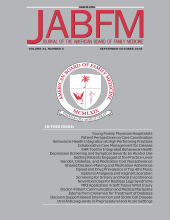Abstract
Objective: Medication errors can be caused by lack of agreement between what physicians believe patients are taking and what patients actually take. There has been little systematic research to find the best way to reconcile medication lists in primary care. The objective of this study was to assess the impact of 2 interventions on agreement between electronic medical record medication lists and what patients report actually taking.
Methods: This study was a factorial randomized trial that randomized 440 eligible patients (English-speaking, age 18 and older, taking at least 2 prescriptions) visiting 20 primary care physicians; 367 completed the study. Interventions included (1) providing patients a printed copy of their current medication list at check-in and (2) beginning the medication review with an open-ended question. Patients were randomized to receive no intervention, one or the other intervention, or both interventions. The outcome measure was agreement on all prescription and nonprescription medications, vitamins, and supplements between the list from the electronic medical record after the visit and a list based on patient report generated during a phone interview within a week of the office visit.
Results: Agreement rates between medication lists and patient report for the 4 study groups were: 67.4% in the no intervention group, 66.7% in the printed list only group, 58.1% in the open-ended question only group, and 75.6% in the combined intervention group. Both a printed list and beginning a medication discussion with an open-ended question were required before any significant increase in agreement was observed.
Conclusions: While neither intervention alone improved medication list agreement, these interventions may have value in a multistep protocol to improve the agreement of medication lists in primary care offices. Baseline agreement was much higher than expected, possibly reflecting a Hawthorne effect.







